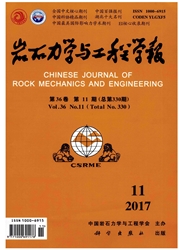

 中文摘要:
中文摘要:
福州长乐国际机场高速二期金鸡山隧道是双向八车道连拱隧道,隧道区域内节理发育,开挖过程易于产生块体,而块体稳定则是公路隧道施工过程中最为关键的问题之一。通过对金鸡山隧道中导洞开挖掌子面及其他出露区域的节理进行精细化采集与描述,经统计分析后预测隧道正洞区域内的节理分布,运用关键块体理论分析中导洞节理精细采集断面所对应的隧道正洞区域在开挖过程中可能产生的关键块体的位置、大小、下滑力、安全系数等与关键块体稳定相关的参数。对各关键块体在先后施加锚杆和衬砌加固的情况下进行力学计算,分析块体的稳定性,评价支护方案,为隧道的设计与施工提供依据。
 英文摘要:
英文摘要:
Jinjishan tunnel in project of Fuzhou airport expressway construction is multi-arch tunnel with eight lanes in China. In surrounding rock of the tunnel, joints were developed which cut the original rock blocks into even smaller blocks. The blocks can be easily disturbed and become unstable during tunnel excavation. To keep the blocks stable is one of the most important problems in construction of the highway tunnel. Data of joints unveiled during excavation in several cross-sections of mid-drift of the tunnel and other areas are collected in detail and described meticulously. Based on statistical analysis of the data, distribution of joints in whole face tunnel relative to the same cross-section is forecasted. The block theory is adopted to study the location, volume, sliding force, safety factor and other parameters of key blocks in the cross-sections of whole face tunnel. Mechanical calculations of stability are performed to analyze the key blocks in different situations which are the none of reinforced situation, reinforced by anchors situation, and reinforced by anchors and shotcrete situation. The situations are evaluated and advices are made for the engineering application of the tunnel.
 同期刊论文项目
同期刊论文项目
 同项目期刊论文
同项目期刊论文
 期刊信息
期刊信息
